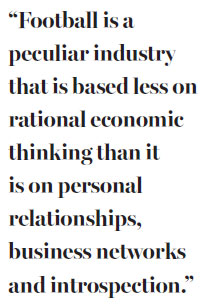Politics and profit mix on the pitch

New owners have bought in for a mixture of reasons, not including sudden passion for teams' home regions
Among many people in England, the recent spate of football club acquisitions by Chinese investors has been warmly welcomed. The potential influx of cash that is perceived as being associated with such investments often prompts fans to look ahead to big-name signings by their clubs.
Some fans even see the investors as being local patriots, just like them: people with a passion for the clubs they own, borne of the same cradle-to-grave loyalty that diehard fans exhibit.
The likes of Tony Xia have expressed their long-term support for clubs they have purchased. Whatever the strength and depth of their loyalty, however, the new influx of owners has bought into football for a mixture of political and commercial reasons, not because they have suddenly developed a passion for England's West Midlands region.
Among the political reasons, Britain (under the leadership of former prime minister David Cameron and former chancellor George Osborne) long played a game of football diplomacy. For instance, when President Xi Jinping visited the country last year, a trip which coincided with CMC taking a 13 percent stake in Manchester City, Cameron gave 3 million pounds ($3.8 million; 3.5 million euros) to China to help fund its football development.
At the same time, Osborne actively courted Chinese investment for major infrastructure and regional development projects. Some argue he used football as a lever to enable this.
It is therefore no surprise that the three clubs recently acquired by Chinese investors - Aston Villa, West Bromwich Albion and Wolverhampton Wanderers - are all located along the proposed High Speed 2 rail link.

Of the clubs also rumored to be on China's shopping list, Liverpool, Leeds and Hull are also connected to this project. And one can understand the interest of investors: construction, engineering and property development opportunities are also associated with the British government's plans - it could be good business for China.
Yet in simple commercial terms, buying an English football club makes sense, too. The Premier League continues to be one of the biggest sports leagues in the world. Its new domestic television deal is worth 5.14 billion pounds over the next three years, which means in the annual football money rankings most of the top 20 places will be occupied by English clubs.
The revenue from the 200-plus overseas markets in which the Premier League is broadcast can then be added in, as well as income from premium priced ticketing, merchandising and sponsorships.
That's big business, big money for club owners from China.
Making the most of one's investment, though, is a major challenge for China's moneymen.
Football is a peculiar industry that is based less on rational economic thinking than it is on personal relationships, business networks and introspection.
As such, European football (but particularly English football) has a unique culture that is sometimes difficult to understand. Cultural appreciation is something the Chinese investors have to learn, hence a crucial element of their acquisition strategies must involve accumulating knowledge from third parties.
Getting the right help and correct advice from people with experience in English football is essential, and we have therefore seen people with extensive experience assisting investors from their initial approaches for clubs through to their ultimate running of their newly bought assets.
But this is not the only challenge the new owners face: controlling costs (particularly of acquiring and retaining players) is one issue, building sustainable revenue streams is another. But fans may prove to be the ultimate challenge facing the owners.
European football has a distinctive heritage that has produced a rich culture. Fans love their clubs, which are often based in the towns and cities where people are born. They rarely switch their loyalties.
When times are good, fans show immense support for club owners; but when things go wrong, fans can rapidly become critical, aggressive and, in some cases, directly confrontational. The new wave of Chinese owners should be aware that being involved in football is not always as easy as they might think it is.
The author is a professor of sports enterprise at the University of Salford Business School. He is also the founding editor of Sport, Business and Management: An International Journal. The views do not necessarily reflect those of China Daily.
(China Daily Africa Weekly 08/12/2016 page8)
Today's Top News
- Foreign ministers of China, Egypt call for Gaza progress
- Shield machine achieves Yangtze tunnel milestone
- Expanding domestic demand a strategic move to sustain high-quality development
- Xi hears report from Macao SAR chief executive
- Xi hears report from HKSAR chief executive
- UN envoy calls on Japan to retract Taiwan comments






























